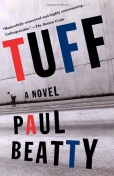BKMT READING GUIDES
Tuff: A Novel
by Paul Beatty
Paperback : 272 pages
0 club reading this now
0 members have read this book
Weighing in at 320 pounds, Winston ?Tuffy? Foshay, is an East Harlem denizen who breaks jaws and shoots dogs and ...
Introduction
As fast-paced and hard-edged as the Harlem streets it portrays, Tuff shows off all of the amazing skill that Paul Beatty showed off in his first novel, The White Boy Shuffle.
Weighing in at 320 pounds, Winston ?Tuffy? Foshay, is an East Harlem denizen who breaks jaws and shoots dogs and dreams of millions from his idea Cap?n Crunch: The Movie, starring Danny DeVito. His best friend is a disabled Muslim who wants to rob banks, his guiding light is an ex-hippie Asian woman who worked for Malcolm X, and his wife, Yolanda, he married from jail over the phone. Shrewdly comical as this dazzling novel is, it turns acerbically sublime when the frustrated Tuffy agrees to run for City Council. Smartly irreverent and edgily fierce, Tuff is a bona fide original.
Paul Beatty's eponymous protagonist, Tuffy, wouldn't seem the type to sidle up too close to the word adorable. At 300 pounds, this thug is a true heavyweight in his East Harlem neighborhood. He robs, he kills, he gets high. But by the end of Beatty's follow-up to The White Boy Shuffle, he is as complexly drawn, as funny, and as lovable as any character in recent memory. The author torques his man into an uncomfortable position: this mighty rose in Spanish Harlem decides to run for City Council. Tuffy--a.k.a. Winston Foshay--is having a tough time of it. Sick of selling drugs and "regulating" neighborhood scams, he wants a better way to support his wife and baby son. His first solution is to get himself a Big Brother (even though he's 22 years old). With the help of his new Brother--who turns out to be the rabbi Spencer Throckmorton, a Jewish black man who receives no end of torment from the Muslim contingent of Tuffy's crew--Tuffy runs.
Beatty nails the social nuances of East Harlem right down to the ground. When Tuffy acquires a gun, he considers telling his best friend Fariq about it, but "decided against it. Once people knew you had a gun, it was like having a car--everyone begging to borrow it, wanting you to use it to make their lives easier." Beatty locates irony constantly and quietly: Tuffy and his wife, Yolanda, go to the local school to vote, and the "flag over the entrance was flying at half-mast because the pulleys had rusted shut." Beatty also has a great eye for the way people move; this is a writer who has been paying attention. Spencer takes a late-night walk with Tuffy, through East Harlem. A group of teens approaches, frightening Spencer.
The boisterous youths were only two steps away from him--so close he could feel the chill emanating off their ice-cold scowls. Winston walked toward the group, reached out, and, without breaking stride, shook the hand of the lead gargoyle.And throughout, Beatty writes--records, it sometimes seems, so dead-on is his tone--incredibly funny dialogue. As is only right, he saves all the best lines for Tuffy. In order to better understand Spencer's Jewishness, Tuffy, a film buff, rents Schindler's List. He complains to Spencer: "I mean, the movie was terrible. I couldn't get past that there were no Jews as tall as Schindler. In all of Germany the tallest Jew went up to Schindler's belly button?" And this is the final, trumping pleasure of Beatty's book: it always returns to Tuffy. With its broad portrait of a fish out of water and its wicked, satirical tone, the novel sometimes threatens to careen into Tom Wolfe territory. Beatty wisely reins in and concentrates on his hero. The author seems a little in love with Tuffy, and by the end, we are too. --Claire Dederer
Discussion Questions
No discussion questions at this time.Book Club Recommendations
Recommended to book clubs by 0 of 0 members.
Book Club HQ to over 88,000+ book clubs and ready to welcome yours.
Get free weekly updates on top club picks, book giveaways, author events and more








